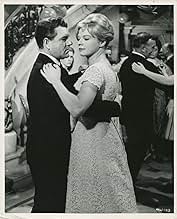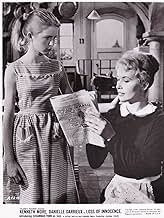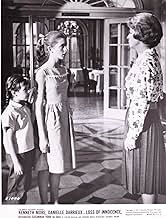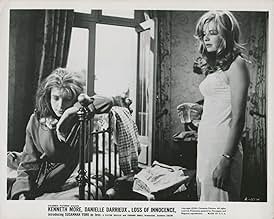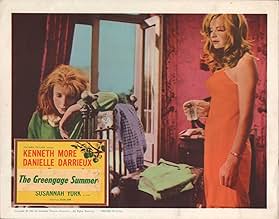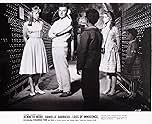VALUTAZIONE IMDb
6,7/10
626
LA TUA VALUTAZIONE
Aggiungi una trama nella tua linguaTeenage Joss Grey vacations in France with her family. Her mother falls ill, leaving her in the care of a hotel manager having an affair with a charming older man towards whom Joss develops ... Leggi tuttoTeenage Joss Grey vacations in France with her family. Her mother falls ill, leaving her in the care of a hotel manager having an affair with a charming older man towards whom Joss develops an attraction, transitioning from girl to woman.Teenage Joss Grey vacations in France with her family. Her mother falls ill, leaving her in the care of a hotel manager having an affair with a charming older man towards whom Joss develops an attraction, transitioning from girl to woman.
- Regia
- Sceneggiatura
- Star
Raymond Gérôme
- Renard
- (as Raymond Gerome)
André Maranne
- Monsieur Dufour
- (as Andre Maranne)
Harold Kasket
- Monsieur Prideaux
- (as Harold Kaskett)
Jacques B. Brunius
- Monsieur Joubert
- (as Jacques Brunius)
Will Stampe
- Monsieur Armand
- (as Will Stamp)
Jacques Dhéry
- Bargee
- (as Jacques Dhery)
Recensioni in evidenza
In the early 1960s there were several movies that put a teen-aged girl into a moral dilemma that was difficult even for people three times her age. But the performances of Jill Haworth in "Exodus," Hayley Mills in "The Chalk Garden" and Merrie Spaeth and Tippy Walker in "The World of Henry Orient" are overshadowed by that of Susannah York in "The Greengage Summer" (1961).
York plays a responsible person who falls in love with a criminal -- a professional thief, played by Kenneth More, who finds her very attractive. She is sixteen, he is in his 40s. Without parents for the summe, she is in charge of her younger siblings; he is single and carefree. But there is no seduction here, from either party.
Susannah York's Joss trembles and blushes as someone ready to throw pride and morality to the wind in the name of love. Kenneth More's Eliot, initially a copy of Charles Boyer's Pepe in "Algiers" (1940), becomes genuinely awkward as he tries to understand her exuberance, and as he rediscovers a pre-criminal sense of honor within himself. The relationship of these two unlikely lovers is erotic, but without the smutty sex we now expect from such cinematic situations, and without the sermonizing or soft-focus slow motion that became fashionable for awhile a few years after this movie and those with a similar theme.
Realistic dialogue and lush background scenes are juxtaposed against embarrassing and unspoken emotions, making this film a haunting exposition.
Kevin Cisneros
York plays a responsible person who falls in love with a criminal -- a professional thief, played by Kenneth More, who finds her very attractive. She is sixteen, he is in his 40s. Without parents for the summe, she is in charge of her younger siblings; he is single and carefree. But there is no seduction here, from either party.
Susannah York's Joss trembles and blushes as someone ready to throw pride and morality to the wind in the name of love. Kenneth More's Eliot, initially a copy of Charles Boyer's Pepe in "Algiers" (1940), becomes genuinely awkward as he tries to understand her exuberance, and as he rediscovers a pre-criminal sense of honor within himself. The relationship of these two unlikely lovers is erotic, but without the smutty sex we now expect from such cinematic situations, and without the sermonizing or soft-focus slow motion that became fashionable for awhile a few years after this movie and those with a similar theme.
Realistic dialogue and lush background scenes are juxtaposed against embarrassing and unspoken emotions, making this film a haunting exposition.
Kevin Cisneros
This film is a distant memory of Sunday afternoons in my teens when this film was still played in the UK. How can we get it released on video? The innocence of the girl falling in love with the thief, it was gripping. ten out of ten
I saw this lovely little film shortly after it first appeared. It is a thoroughly charming and winning motion picture about first love, disillusionment, and acknowledgement, as the young and lovely Susannah York comes of age. She is absolutely winning in one of her first major roles. Kenneth More is superb as the object of York's unrequited affections, and Danielle Darrieux is splendid as More's jealous lover. Wonderful scenes of the French countryside (I remember especially a charming visit to a wine chateau) make this a delightfully wistful experience.
I'm surprised to find that this has not as yet been given a video release. More and more films from the various studios' archives are finding their way to a public that craves the kind of entertainment which was once much more available to those willing to attend a film in a theatrical setting, that is, films with a respect for adult sensibilities and without the tiniest nod to the sensation-seekers who crave explosions, mindless (and excruciatingly extended sequences of) violence and special effects which are, let's face it, beginning the inevitable downward spiral of diminishing returns. Really! Are any but those who refuse to refine their tastes in theater, films, etc., still impressed by the ever more astonishing demonstrations of the computer geniuses' craft and which are the reason that dozens and dozens of artisans make a closing credit roll-up almost as long as a typical film these days (and which precious few theater patrons will now sit through)?
I was able to see "Loss of Innocence" (its American release title) at a first-run theater in Beverly Hills, California and the print was absolutely pristine, doing full justice to Freddie Young's exceptionally fine work behind the Technicolor cameras. A projectionist of my acquaintance at the time told me that Columbia Pictures Corporation was especially particular about the condition and presentation of first-run films released by that studio, sending technicians frequently during first-run engagements of Columbia films to check on the condition of projection equipment, correcting any flaws that may have shown up in the reels, the proper masking of projected films according to the aspect ratio used in production, and so forth. I no longer live in southern California but I'm somewhat reluctant to believe that such care (and expense) is still lavished on films at first-run houses down there these days. It certainly doesn't appear to be true here in the Northwest.
Anyway, with the lovely scenery of its French countryside settings and two truly beautiful actresses (the exquisitely young English rose, Miss York, and that elegant flower of French womanhood, Madame Darrieux) to delight one's eyes, plus a delicately scripted story of more than unusual interest, this is a film I shall always remember as one of the most ravishing cinema-going experiences that I can recall. I join others who have commented on this site in hoping that we will one day be rewarded with a happy refreshing of our memories with a video release of this gem.
I was able to see "Loss of Innocence" (its American release title) at a first-run theater in Beverly Hills, California and the print was absolutely pristine, doing full justice to Freddie Young's exceptionally fine work behind the Technicolor cameras. A projectionist of my acquaintance at the time told me that Columbia Pictures Corporation was especially particular about the condition and presentation of first-run films released by that studio, sending technicians frequently during first-run engagements of Columbia films to check on the condition of projection equipment, correcting any flaws that may have shown up in the reels, the proper masking of projected films according to the aspect ratio used in production, and so forth. I no longer live in southern California but I'm somewhat reluctant to believe that such care (and expense) is still lavished on films at first-run houses down there these days. It certainly doesn't appear to be true here in the Northwest.
Anyway, with the lovely scenery of its French countryside settings and two truly beautiful actresses (the exquisitely young English rose, Miss York, and that elegant flower of French womanhood, Madame Darrieux) to delight one's eyes, plus a delicately scripted story of more than unusual interest, this is a film I shall always remember as one of the most ravishing cinema-going experiences that I can recall. I join others who have commented on this site in hoping that we will one day be rewarded with a happy refreshing of our memories with a video release of this gem.
Greengage Summer (Loss Of Innocence, American release title) is a wonderful, nostalgic movie that I love to watch over and over again. How can you improve upon Kenneth More looking over at a blossoming Susannah York in one of her first films, tasting the perspiration on her face and saying sweetly: "Dew of Joss"? Sigh. So romantic!
The performances of all the children are first rate, and the actor who plays Paul is perfectly slimey for his part. You can almost smell him through the tv screen! In the novel by Rumer Godden I think there were two more children than in the movie, but who's counting? Best scenes: the French countryside, the sightseeing tour to the church, winery and the cafe, the dance scene at the hotel, and Eliot saying goodbye to Joss at the end. The movie also boasts rather gorgeous music that is available on CD. Check it out. I sounded out the main theme and play it on my piano quite often.
They just don't make films like this anymore, and if they tried to they would have the main characters in bed together in the first five minutes. Yuck. Give me yesterday, and understated romance over the tripe they call entertainment today.
The performances of all the children are first rate, and the actor who plays Paul is perfectly slimey for his part. You can almost smell him through the tv screen! In the novel by Rumer Godden I think there were two more children than in the movie, but who's counting? Best scenes: the French countryside, the sightseeing tour to the church, winery and the cafe, the dance scene at the hotel, and Eliot saying goodbye to Joss at the end. The movie also boasts rather gorgeous music that is available on CD. Check it out. I sounded out the main theme and play it on my piano quite often.
They just don't make films like this anymore, and if they tried to they would have the main characters in bed together in the first five minutes. Yuck. Give me yesterday, and understated romance over the tripe they call entertainment today.
Lo sapevi?
- QuizSeveral years after Kenneth More's death, both Lewis Gilbert and Susannah York said in interviews that More had been miscast in this film and that Dirk Bogarde would have been better in the role. However, More wanted very much to be in the film, precisely because the role would be an unusual one for him, and, nearing his fifties, he wanted to change his movie image and find more complex and mature parts.
- Curiosità sui creditiOpening credits prologue: IN THE GREEN AND GOLD CHAMPAGNE COUNTRY OF FRANCE
- ConnessioniFeatured in Talkies: Remembering Kenneth More: Part One (2019)
I più visti
Accedi per valutare e creare un elenco di titoli salvati per ottenere consigli personalizzati
- How long is Loss of Innocence?Powered by Alexa
Dettagli
- Data di uscita
- Paese di origine
- Lingue
- Celebre anche come
- El fin de la inocencia
- Luoghi delle riprese
- Gare SNCF, 28 Boulevard de Verdun, Béziers, Hérault, Francia(Madame Zizi steps out of the train)
- Azienda produttrice
- Vedi altri crediti dell’azienda su IMDbPro
- Tempo di esecuzione1 ora 39 minuti
- Mix di suoni
- Proporzioni
- 1.33 : 1(original ratio)
Contribuisci a questa pagina
Suggerisci una modifica o aggiungi i contenuti mancanti

Divario superiore
By what name was Quell'estate meravigliosa (1961) officially released in Canada in English?
Rispondi
